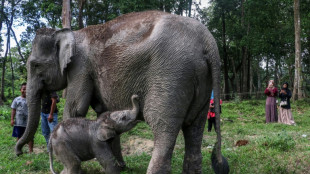
-
 Indonesian President Prabowo to visit China this week
Indonesian President Prabowo to visit China this week
-
Critically endangered Sumatran elephant calf born in Indonesia

-
 The marble 'living Buddhas' trapped by Myanmar's civil war
The marble 'living Buddhas' trapped by Myanmar's civil war
-
How East Germany's 'traffic light man' became a beloved icon

-
 Japan expresses concern to China over Russia-North Korea ties
Japan expresses concern to China over Russia-North Korea ties
-
Asian markets swing ahead of toss-up US election

-
 Palau polls open as pro-US president faces election test
Palau polls open as pro-US president faces election test
-
'Panic buttons,' SWAT teams: US braces for election unrest

-
 Hundreds of UK police sacked for misconduct
Hundreds of UK police sacked for misconduct
-
Harris, Trump fight through final campaign hours

-
 Top-ranked Nelly Korda wins LPGA Player of Year award
Top-ranked Nelly Korda wins LPGA Player of Year award
-
Israel accuses Turkey of 'malice' over UN arms embargo call

-
 Man City will 'struggle' to overcome injury crisis, says Guardiola
Man City will 'struggle' to overcome injury crisis, says Guardiola
-
First candidates grilled in parliament test for EU top team

-
 Fulham strike twice in stoppage time to beat Brentford
Fulham strike twice in stoppage time to beat Brentford
-
Saints fire head coach Allen after seventh straight NFL defeat

-
 Is the US election really so close?
Is the US election really so close?
-
Mitrovic hat-trick fires Al Hilal past Esteghlal, Neymar replaced early

-
 Three charged as Modi slams Canada Hindu temple violence
Three charged as Modi slams Canada Hindu temple violence
-
NATO will 'stay united' whoever wins US election: Rutte

-
 Turkey sacks 3 mayors on 'terror' charges, sparking fury in southeast
Turkey sacks 3 mayors on 'terror' charges, sparking fury in southeast
-
Thousands protest alleged election fraud in Georgia

-
 Spain dreads more flood deaths on day six of rescue
Spain dreads more flood deaths on day six of rescue
-
Germany's Baerbock offers Ukraine no guarantees as Kyiv sounds alarm

-
 Edu resigns as Arsenal sporting director
Edu resigns as Arsenal sporting director
-
Prince William plays rugby on S.Africa climate prize visit

-
 French boxing quits international body to keep its fighters at Olympics
French boxing quits international body to keep its fighters at Olympics
-
Gaza hospital hit as Israel tells UN aid agency ties to be cut

-
 Ailing Spurs coach Popovich reportedly out indefinitely
Ailing Spurs coach Popovich reportedly out indefinitely
-
Harris, Trump in last campaign push as polls deadlocked

-
 Sabalenka advances to WTA Finals last four as Zheng ousts Rybakina
Sabalenka advances to WTA Finals last four as Zheng ousts Rybakina
-
Noah Lyles fails to make cut for men's world track athlete of year

-
 Slot braced to face 'special' Alonso in Anfield homecoming
Slot braced to face 'special' Alonso in Anfield homecoming
-
Germany's Baerbock offers no Ukraine guarantees as Kyiv sounds alarm

-
 Montreux Jazz Festival hails 'godfather' Quincy Jones
Montreux Jazz Festival hails 'godfather' Quincy Jones
-
Chile football star Vidal accused of sexual assault

-
 Injured Atonio called up to France squad before Japan Test
Injured Atonio called up to France squad before Japan Test
-
'Guardiola best coach in the world', says Amorim before Man United move

-
 Fake X accounts promote COP hosts UAE, Azerbaijan
Fake X accounts promote COP hosts UAE, Azerbaijan
-
Turkey sacks 3 pro-Kurdish mayors for 'terror ties'

-
 China's Zheng beats Rybakina at WTA Finals
China's Zheng beats Rybakina at WTA Finals
-
Music mastermind Quincy Jones dies aged 91

-
 Spain dreads more flood deaths as rain pounds Catalonia
Spain dreads more flood deaths as rain pounds Catalonia
-
From abortion to bobcat hunting: US vote not just for president

-
 Former Scotland rugby captain Stuart Hogg admits domestic abuse
Former Scotland rugby captain Stuart Hogg admits domestic abuse
-
The US election by numbers

-
 Win the vote but still lose? Behold America's Electoral College
Win the vote but still lose? Behold America's Electoral College
-
The seven states that will decide the US presidency

-
 Ancelotti a reminder of Milan's glorious past and uncertain present
Ancelotti a reminder of Milan's glorious past and uncertain present
-
Brazil Grand Prix - three things we learned


'War ruined me': Lebanon's farmers mourn lost season
Lebanese farmer Abu Taleb briefly returned to his orchard last month to salvage an avocado harvest but ran away empty handed as soon as Israeli air raids began.
"The war broke out just before the first harvest season," said Abu Taleb, displaced from the village of Tayr Debba near the southern city Tyre.
"When I went back in mid-October, it was deserted... it was scary," said the father of two, who is now sheltering in Tripoli more than 160 kilometres to the north and asked to be identified by a pseudonym because of security concerns.
Abu Taleb said his harvesting attempt was interrupted by an Israeli raid on the neighbouring town of Markaba.
He was forced back to Tripoli without the avocados he usually exports every year.
Agricultural regions in Lebanon have been caught in the crossfire since hostilities between Israel and Hezbollah ramped up in October last year, a full-scale war breaking out on September 23.
The UN's agriculture agency, FAO, said more than 1,909 hectares of farmland in south Lebanon had been damaged or left unharvested between October last year and September 28.
The conflict has also displaced more than half a million people, including farmers who abandoned their crops just when they were ready to harvest.
Hani Saad had to abandon 120 hectares of farmland in the southern region of Nabatiyeh, which is rich in citrus and avocado plantations.
"If the ceasefire takes place within a month, I can save the harvest, otherwise, the whole season is ruined," said Saad who has been displaced to the coastal city of Jounieh, north of Beirut.
When an Israeli strike sparked a fire in one of Saad's orchards, he had to pay out of his own pocket for the fuel of the fire engine that extinguished the blaze.
His employees, meanwhile, have fled. Of 32 workers, 28 have left, mainly to neighbouring Syria.
- 'Worst phase' -
Israeli strikes have put at least two land crossings with Syria out of service, blocking a key export route for produce and crops.
Airlines have suspended flights to Lebanon as insurance costs soar.
This has dealt a deadly blow to agricultural exports, most of which are destined for Gulf Arab states.
Fruit exporter Chadi Kaadan said exports to the Gulf have dropped by more than 50 percent.
The supply surplus in the local market has caused prices to plummet at home, he added.
"In the end, it is the farmer who loses," said Saad who used to earn $5000 a day before the war started.
Today, he barely manages $300.
While avocados can stay on the tree for months, they are starting to run out of water following Israeli strikes on irrigation channels, Saad said.
Citrus fruits and cherimoyas have already started to fall.
"The war has ruined me. I spend my time in front of the TV waiting for a ceasefire so I can return to my livelihood," Saad told AFP.
Gaby Hage, a resident of the Christian town of Rmeish, on the border with Israel, is one of the few farmers who decided to stay in south Lebanon.
He has only been able to harvest 100 of his 350 olive trees, which were left untended for a year because of cross-border strikes.
"I took advantage of a slight lull in the fighting to pick what I could," he told AFP.
Hage said agriculture was a lifeline for the inhabitants of his town, which has been cut off by the war.
Ibrahim Tarchichi, president of the farmers' union in the Bekaa Valley, which was hit hard by the strikes, believes that agriculture in Lebanon is going through the "worst phase" of its recent history.
"I have experienced four wars, it has never been this serious," he said.
T.Batista--PC
